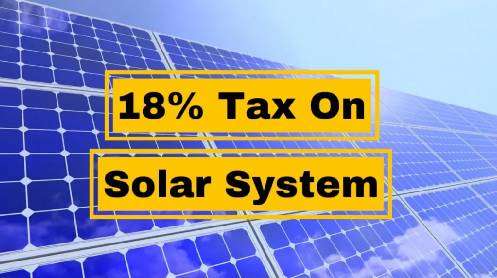KARACHI: Pakistan’s renewable energy sector has sounded the alarm over the government’s proposed 18% General Sales Tax (GST) on imported solar panels, cautioning that the move could reverse recent gains in clean energy adoption, raise electricity costs, and negatively impact consumers, businesses, and farmers.
Solar energy has emerged as a critical alternative amid rising fossil fuel prices and mounting electricity bills. However, stakeholders argue that this tax threatens to make solar installations unaffordable, curbing demand and undermining the national energy transition.
“An 18% GST on imported solar panels could derail Pakistan’s shift towards clean and accessible energy,” said one industry analyst. “This will raise costs for end-users and reduce the overall attractiveness of solar installations.”
Economic and Sectoral Fallout
The ripple effects could extend to the broader economy. Increased solar panel prices would also affect demand for inverters, batteries, and wiring, shrinking the solar ecosystem and diminishing tax revenues from allied sectors.
Economist and industry observers warn of rising production costs for manufacturers, higher retail prices, and declining consumer spending power. “Middle-income families will see their disposable incomes shrink further,” said a senior economist. “And that will have far-reaching consequences for Pakistan’s domestic markets and overall economic health.”
In agriculture, where many farmers rely on solar-powered tube wells, the impact could be even more severe. “With panel prices rising, farmers will be forced to use more expensive diesel or grid electricity,” warned Afaq Ahmed, Vice President of the Pakistan Solar Association (PSA). “This will increase production costs, reduce agricultural yields, and fuel inflation across food markets.”
Local Manufacturing Not Yet Ready
While the government argues that the GST is meant to encourage local manufacturing, sector leaders say Pakistan lacks the infrastructure and capacity to meet demand with quality, high-efficiency solar panels.
Mian Fahad, Country Director for Growatt in Pakistan and neighboring countries, noted:
“Local manufacturing currently contributes less than 10% of national demand. Production is restricted by a lack of advanced technology, expensive imported raw materials, and a shortage of skilled labour.”
He recommended a phased approach instead, with tax exemptions on raw materials, R\&D investment, and targeted skill development.
Zakir Ali, CEO of Inverex, supported the government’s intention but stressed that it must be backed by supportive policy mechanisms.
“We need tax-free zones for manufacturers and duty exemptions on imported equipment. Otherwise, this tax will just inflate prices for consumers and encourage smuggling through grey channels, which would destabilise the market.”
He proposed a balanced solution: a 5% protective duty on finished panels alongside robust support for local manufacturers.
Shaaf Mehboob, CEO of Adaptive Technologies, offered a blunt critique:
“To the best of my knowledge, no real solar panel manufacturing is currently happening in Pakistan. The core challenges — lack of advanced technology, raw materials, and skilled labour — remain unaddressed.”
This was echoed by Maroof Zuberi, COO of ESL Renewables:
“Some local manufacturing exists, but it’s limited to low-wattage panels using outdated technology. Without economies of scale and significant foreign investment, we cannot expect Pakistan to produce globally competitive products.”
He added, “Taxing imports may only benefit a few small manufacturers at the cost of national solar adoption.”
PSA: Tax Undermines National Energy Goals
The Pakistan Solar Association (PSA) has submitted a detailed representation to the Ministry of Power, urging a reconsideration of the proposed GST.
“There is no high-efficiency solar panel manufacturing currently in Pakistan,” said Waqas Moosa, Chairman of the PSA. “Existing producers are using old P-type technology and producing small wattage panels — not comparable with imported options.”
He emphasized that less than 3% of national solar demand is met locally, and that industrial policy must not come at the cost of affordable access to solar energy.
“Policy must strike a balance between quality access for consumers and long-term industrial goals,” he stated.
The PSA recommends a multi-pronged strategy including:
- Phased incentives for local assembly and R\&D
- GST exemptions for residential and small-scale users
- Tax relief on the import of solar raw materials and machinery
A Call for Balanced, Forward-Looking Policy
Industry experts and business leaders are united in their call for a more nuanced and supportive approach to domestic solar manufacturing.
“The proposed GST risks halting Pakistan’s clean energy momentum at a critical juncture,” said an industry veteran. “We need policies that foster both affordability for consumers and long-term investment in innovation.”
In conclusion, the proposed 18% GST on imported solar panels — though aimed at encouraging domestic industry — may unintentionally stifle Pakistan’s progress toward a cleaner, more sustainable energy future. Industry leaders urge the government to revise the policy to ensure that affordability, innovation, and investment go hand in hand.







